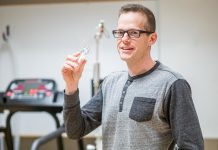Patients with Type II diabetes who also suffer from obstructive sleep apnea can lower their glucose levels by receiving the most common sleep apnea therapy, a new study has found. The study appeared in the Feb. 28 Archives of Internal Medicine.
Dr. James Herdegen, associate professor of medicine at the University of Illinois at Chicago and medical director of the UIC Center for Sleep and Ventilatory Disorders, and his co-authors measured glucose levels of participants before and after continuous positive airway pressure therapy, or CPAP.
Obstructive sleep apnea is a sleep disorder in which a person's breathing stops or becomes irregular during sleep as a result of a collapsed airway. This disrupts healthy sleep and causes a number of short-term and long-lasting effects that threaten health. Previous research has found sleep apnea sufferers are nine times more likely to have diabetes than those without the sleep disorder.
CPAP, the most common treatment option for obstructive sleep apnea, involves wearing a mask that supplies a steady stream of air through the nose during sleep. The airflow keeps the nasal passages open sufficiently to prevent airway collapse.
When CPAP treatment was administered for at least four hours each day, there was a significant reduction in the participants' glucose levels. By lowering glucose levels, patients with diabetes significantly can reduce their risk of developing late-stage complications including cardiovascular, kidney, eye and nerve disease.
Continue Reading Below ↓↓↓
"With such clear evidence for the high risk of sleep apnea among patients with Type II diabetes, it is encouraging that our data show patients can achieve better control of their glucose levels with CPAP therapy," Herdegen said. Based on the study's results, Herdegen recommends that diabetic patients who exhibit symptoms such as excessive daytime sleepiness and loud, persistent snoring be screened for sleep apnea and seek treatment if the sleep disorder is confirmed.
More than 18 million people in the United States have diabetes, and studies show this number is on the rise. Diabetes is a disease in which the body does not produce or properly use insulin and can lead to death if not treated properly. Approximately 18 million Americans suffer from obstructive sleep apnea, although 90 percent have not been diagnosed.
Other authors on the paper are Drs. Ambika Babu and Leon Fogelfeld of Rush University Medical Center and John H. Stroger Jr. Hospital of Cook County, Susan Shott of Rush University Medical Center and Dr. Theodore Mazzone of UIC.
Source: University of Illinois









